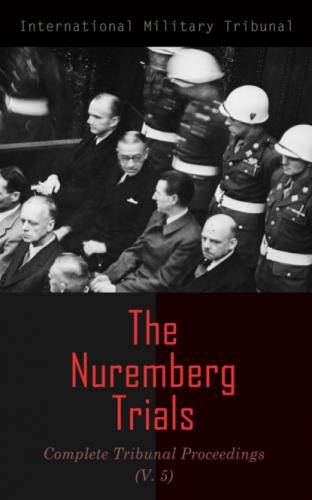The extent of the credit expansion and the importance of mefo financing may be seen from Document Number EC-419, which I now offer as Exhibit Number USA-621 and which consists of a letter from Finance Minister Von Krosigk to Hitler, under date of 1 September 1938. I quote the following figures from the middle of the first page:
“The Reich debt accumulated as follows:
“As of 31 December 1932: Funded debt, 10,400 millions of Reichsmark; short-term debt, 2,100 millions of Reichsmark; debt not published in the budget (trade and mefo bills of exchange), 0.
“As of 30 June 1938: Funded debt, 19,000 million Reichsmark; short-term debt, 3,500 million Reichsmark; and debt not published in the budget (trade and mefo bills of exchange), 13,300 million Reichsmark.
“Total: as of 31 December 1932, 12,500 million Reichsmark; as of 30 June 1938, 35,800 million Reichsmark.”
The Reich debt thus tripled. . .
THE PRESIDENT: Would you read the next section, beginning with the words “Provisions were made to cover. . .”?
LT. BRYSON: “Provisions were made to cover the armament expenditures for the year 1938 (the same amount as in 1937) as follows:
“Five thousand millions from the budget, that is, taxes; 4,000 millions from loans; 2,000 millions from 6-month treasury notes, which means postponement of payment until 1939; total: 11,000 millions.”
The Reich debt thus tripled under Schacht’s management. More than one-third of the total was financed secretly and through the instrumentality of the Reichsbank by mefo and trade bills. It is clear that this amount of financing outside the normal public issues represented armament debt. I read further from Document EC-436, at the beginning of the last long paragraph:
“These mefo bills were used exclusively for financing rearmament; and when in March 1938 a new finance program discontinuing the use of mefo bills was announced by Dr. Schacht, there was a total volume outstanding of 12,000 million marks of mefo bills which had been issued to finance rearmament.”
The character of Schacht’s credit policy and the fact that it was ruthlessly dedicated to the creation of armaments plainly appear from his own speech delivered on 29 November 1938.
I offer it in evidence as Document Number EC-611, Exhibit Number USA-622; and I quote from Page 6 at the beginning of the last paragraph:
“It is possible that no bank of issue in peacetime carried on such a daring credit policy as the Reichsbank since the seizure of power by National Socialism. With the aid of this credit policy, however, Germany created an armament second to none; and this armament in turn made possible the results of our policy.”
Beyond the field of finance Schacht assumed totalitarian control over the German economy generally in order to marshal it behind the rearmament program.
He acquired great power over industry as a result of the Nazi reorganization of German industry along military lines and in accordance with the so-called Leadership Principle. On this point I refer the Tribunal to the transcript for 23 November at Pages 287-290 (Volume II, Pages 227-228); and to the Reichsgesetzblatt 1934, Part I, Page 1194, of which the Tribunal is asked to take judicial notice.
Schacht also exercised broad powers as a member of the Reich Defense Council, which was secretly established on 4 April 1933 and the function of which was preparation for war. The Tribunal is referred to the transcript for 23 November, Page 290 (Volume II, Pages 228-229). I also offer in evidence as Document Number EC-128, Exhibit Number USA-623, a report under date of 30 September 1934, showing the functions of the Ministry of Economics in this respect. The report reveals concentration upon all the familiar wartime economic problems, including stockpiling, production of scarce goods, removal of industry to secure areas, fuel and power supply for war production, machine tools, control of wartime priorities, rationing, price control, civilian supply, and so on. I wish to read into the Record merely an excerpt showing the jurisdiction of the Ministry of Economics, beginning near the top of Page 2 of Document Number EC-128:
Конец ознакомительного фрагмента.
Текст предоставлен ООО «ЛитРес».
Прочитайте эту книгу целиком, купив полную легальную версию на ЛитРес.
Безопасно оплатить книгу можно банковской картой Visa, MasterCard, Maestro, со счета мобильного телефона, с платежного терминала, в салоне МТС или Связной, через PayPal, WebMoney, Яндекс.Деньги, QIWI Кошелек, бонусными картами или другим удобным Вам способом.
